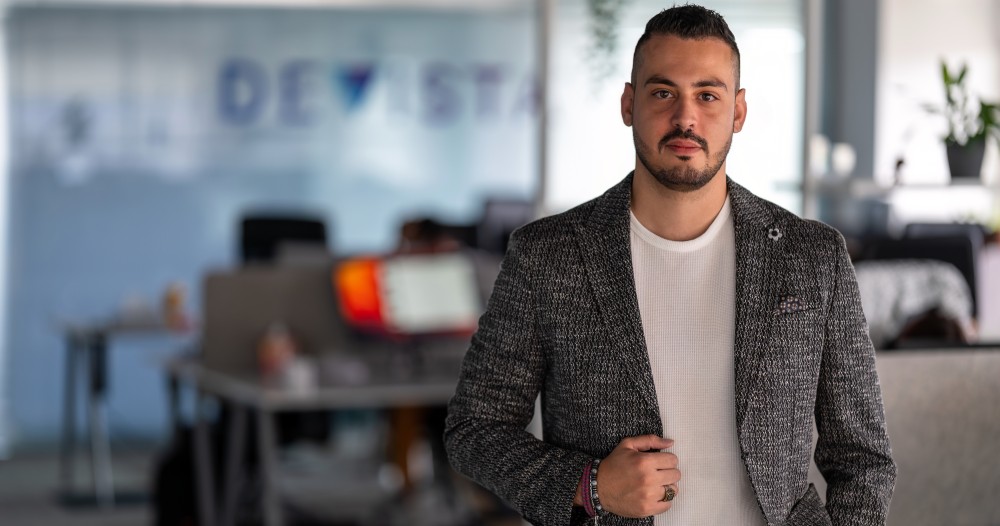Interview with Odai Alokeh, Co-founder & CEO of Laymune

We had a chance to speak with Odai Alokeh, co-founder & CEO of Laymune. Together with his co-founders, they are trying to break the stigma around healthcare in the MENA region, starting with men's reproductive health.
He's an interesting guy, and with Laymune, we must say — he's onto something, solving the real-world problems for the men in the region. Here's what Odai had to say.
Can you tell us a bit more about yourself? What's your background?
I am Romanian, originally from Syria. My background is in computer sciences and programming, and I also have a Master's degree in management from the Polytechnic University in Bucharest.
I had a diverse career at major tech companies like Oracle and SAP, starting as a software engineer and working in different positions — including project management, solution architecture, and management.
I shifted to entrepreneurship four years ago, starting and scaling a software consulting agency in Eastern Europe that was expanded to the Middle East, and now Laymune.
Let's speak about Laymune. What is the market problem you want to solve and where do you see the opportunity?
With Laymune, we want to break the stigma around healthcare in general, starting with men's reproductive health. This is a significant issue we identified and validated in the previous period.
It is suggested that more than 50% of men will experience either erectile dysfunction or premature ejaculation at some point in their lives, and 60% of those men struggle in silence and seek medical help at a much later stage because of multiple reasons, stigma being one of them.
So we want to provide those people with a solution that is easy to use and discrete while helping them improve the quality of their lives.
Another issue we want to help solve is related to counterfeit medication for sexual wellness, especially ED (erectile dysfunction). Many people are turning to shady channels to get these medications, which may not be safe for them.
In contrast, Laymune will provide men with tested medications that have proven to work.
What are the features differentiating your offering from competitors?
No companies in the region do the business the way we do. However, some pharmacies and medical centers provide medication to the same customers we are targeting.
We differentiate ourselves with our end-to-end experience, which integrates several components into one platform. For instance, we offer educational content focused on men's productive health. Also, we are developing an online assessment tool that will create electronic medical reports and then match users with doctors to make online consultations. Finally, we will send the user medication in discreet packaging and make follow-up appointments when needed.
This end-to-end process is our value proposition and what makes us different than existing solutions.
Can you share some numbers and achievements of Laymune?
We are an early-stage startup and have raised a pre-seed investment from the Antler VC, mainly with the collaboration of other partners to kickstart our MVP.
Also, our biggest achievements are assembling the team and our MVP.
We are currently launching our offering and are excited to see the first customers sign up.
What are your medium-term plans?
We are still focused on the short term, which includes launching our MVP at the end of September.
In the medium term, we aim to continuously improve and refine our product and expand its availability to the UAE, KSA, and other markets in the FCC.
Moreover, we will also be looking at other verticals beyond man's reproductive health as it is not the only stigmatized health issue.
Do you have some advice for other entrepreneurs in the digital health space in MENA?
Not specific to MENA, the healthcare sector offers vast opportunities for improvement and innovation. As an entrepreneur in this market, I would suggest focusing on the mission and the impact because we are talking about people's health. Also, they need to be adaptable to changing the market and the demands of users/patients.
How do you see the digital health or HealthTech space in the MENA region?
I see it progressing very well and fast, and this is what encouraged me to kick off this project. There is a lot of openness regulation-wise and also from public entities, which gives startups the possibility to innovate.
So, if you have an idea and can assemble a team - go for it. The MENA region is the place to be.
💡Did you know?
You can take your DHArab experience to the next level with our Premium Membership.👉 Click here to learn more
🛠️Featured tool
 Easy-Peasy
Easy-Peasy
An all-in-one AI tool offering the ability to build no-code AI Bots, create articles & social media posts, convert text into natural speech in 40+ languages, create and edit images, generate videos, and more.
👉 Click here to learn more


